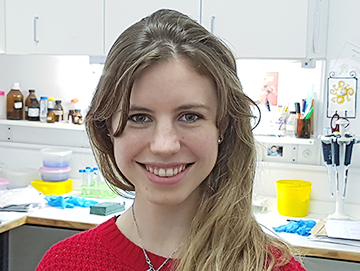CONICET PhD fellow
Director: Andrea Smania
E-Mail: ghedemann@fcq.unc.edu.ar
PhD Thesis Topic
Role of different allelic variants of the global MucA regulator in Pseudomonas aeruginosa
Pseudomonas aeruginosa is an opportunistic pathogen and the etiological agent of a great diversity of infections. Between the latter, P. aeruginosa is the main agent in chronic respiratory infections in patients with Cystic Fibrosis (CF). During adaptation, P. aeruginosa undergoes a transformative process based on genetic mutations. Most mutations occur in specific genes and produce changes or loss of function of the encoding protein and the consequent emergence of adapted phenotypes, among which the mucoid phenotype (mutants in mucA) is one of the most striking features. MucA is a global regulator, which spontaneously and frequently mutates. Mutations in mucA have been largely described as loss-of-function mutations. However, the different allelic variants arising from mucA could lead to the acquisition of new adaptive traits. The hypothesis of this project is that mutations produced in mucA are not inactivating, but generate allelic variants with a) partial maintenance of the original function or with b) the ability to fulfill new regulatory functions that diverge from those of the wild type allele. In this way, we aim to characterize the effect of mutations in MucA with respect to its biochemical, structural and transcriptional properties. The results obtained from this study will contribute to the knowledge of the molecular mechanisms involved in the versatility of P. aeruginosa, which leads to the adaptation to different environmental conditions.



